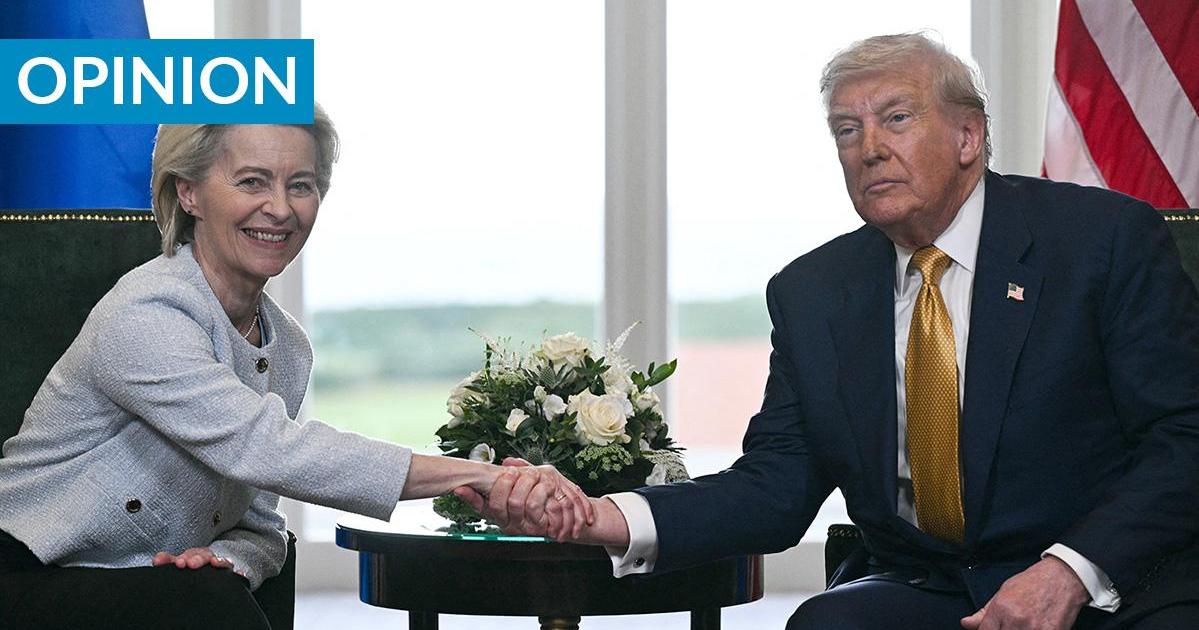Malta may not have much exposure to trade with the US, but it is not reasonable to expect that the EU-US trade deal will not impact us. Our open economy will always be affected by the trade winds blowing far beyond our shores. So, does the EU-US trade deal usher in better economic prospects for the coming years?
I have still not found one expert opinion that welcomes the deal as an excellent achievement for the EU. European Commission President Ursula von der Leyen was perhaps the most optimistic assessor, but then one would expect her to be. She is no doubt gaining experience in crisis management, even if her role calls for much more incisive leadership skills.
Von der Leyen argues: “I think we hit exactly the point we wanted. Rebalance and enable trade on both sides. This means good jobs on both sides of the Atlantic, means prosperity on both sides of the Atlantic and what was important for us.”
How can one honestly argue that protectionism and tariffs can make people’s lives better?
Of course, other European politicians like French Prime Minister François Bayrou and German Chancellor Friedrich Merz were more honest when they admitted that this deal is horrible news for the European economies, with Bayrou describing the July 27 deal as a “dark day” for the EU.
Financial markets are beginning to show some concern about the consequences of this deal. The euro suffered some losses against the US dollar and equity markets on both sides of the Atlantic have shed some of the recent gains. The mood can change dramatically as the flaws in the EU-US trade deal are exposed.
So far, the EU-US trade deal is just a framework that, in essence, imposes a 15% tariff on most EU goods entering the US. Increasing tariffs from an average of 1.2% to 15% will undoubtedly be painful for most European businesses, even if this is better than the 50% threat that Trump announced in the sabre-rattling stage of negotiations.
Not every member state will be affected in the same way. Italy, for instance, will be one of the countries most adversely affected as its food and agricultural industries have significant exports to the US. Still, hope springs eternal and Giorgia Meloni is promising that when the details of implementing the deal are hammered out, Italian farmers and food producers will be spared the pain that now looks inevitable.
Malta may not have much exposure to trade with the US, but it is not reasonable to expect that the EU-US trade deal will not impact us
While the details of the trade deal remain murky, certain known elements threaten its implementation and, therefore, its chances of lasting for long.
Europe has promised to increase its investment in the US by $600 billion. This money has to come from the EU’s private entrepreneurs, who are already struggling to make their businesses more productive. Moreover, overcapacity in the European airline and automotive industries is also an issue that remains unaddressed.
The EU has also promised to buy $750 billion worth of US energy products. Unsurprisingly, von der Leyen is optimistic about the chances of honouring this commitment. She argues: “We still have too much Russian liquid natural gas that is coming through the back door again to our European Union, and some Russian gas and oil still in the EU, which we do not want any more”.
I believe that there is a silver lining to this humiliating deal. The EU leaders will hopefully realise that the Union has its back against the wall and can no longer postpone crucial decisions to improve its governance, its investment policies and its security strategies. To this, one must add the worsening demographic challenges and the so-far-uncontrollable illegal migration.
Today, the EU remains a club of nations that want to enjoy the freedom of trade and movement within the EU borders. The painful reality is that the Union is a fragmented concoction of relatively small states that are not prepared to sacrifice any of their perceived sovereign rights to make the Union a global giant that has the same clout as the US, China or even Russia.
David Collins, a professor of international economic law at City St George’s University of London, told CNN: “This is a humiliating capitulation on behalf of the EU. It makes you wonder: What is it doing for its member states if the UK can, on its own, get a better deal than this giant economy?”
Sadly, Collins is probably right.

